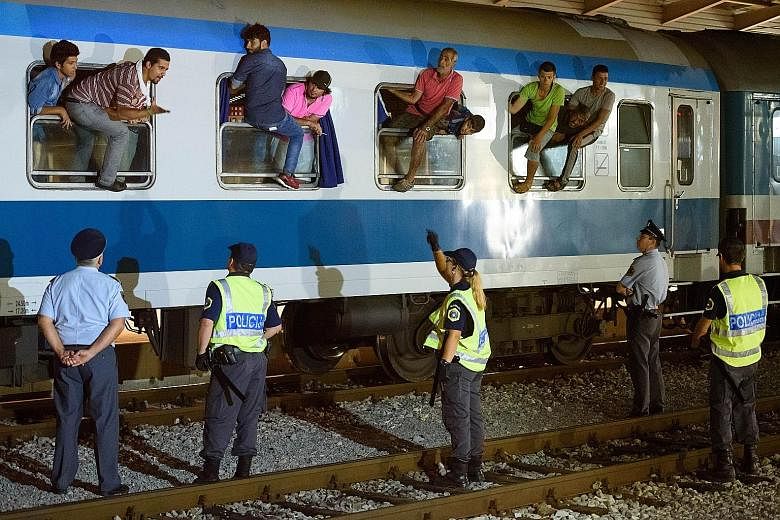ZAGREB • Road and rail routes to northern Europe from the Balkans were closing to migrants yesterday after a string of countries shut their borders in the face of a relentless human wave.
The crisis, challenging the European Union's humanitarian reputation and its vaunted policy of border mobility, triggered an emergency summit of the 28-nation bloc on Wednesday.
Desperate to reach Germany and Sweden, thousands of refugees have travelled by car, bus and train, reaching the southern EU rim in Serbia.
But Hungary sealed off its border with Serbia on Tuesday, displacing the flow to Croatia. After initially vowing to let the refugees through, Croatia on Thursday said it was overwhelmed by the influx, and closed seven of its eight crossing points with Serbia. "Up to now, we have registered 13,000 migrants on Croatian territory," Interior Minister Ranko Ostojic told N1 television station yesterday. "This figure means that our capacities to take in more are saturated."
Migrants tried to continue their northward trek by train through Croatia's neighbour, EU member Slovenia, which then announced it was suspending all Croatian rail links until late yesterday.
Scenes of chaos and despair at the Croatian-Serbian border brought home the human scale of the problem. Thousands were camped in the fields around the rural town of Tovarnik yesterday, whose little train station has become the latest flashpoint in a months-long drama.
Hungary came under renewed criticism on Thursday, a day after riot police on its Serbian border fired tear gas and water cannon at migrants enraged at being blocked from entering the country.
United Nations rights chief Zeid Ra'ad Al Hussein said Hungarian government policy was apparently being guided by "xenophobic and anti-Muslim views", while Serbian Prime Minister Aleksandar Vucic said: "This torture and non-European behaviour must stop."
Unabashed, Hungary's hardline conservative Premier Viktor Orban announced yesterday that hundreds of troops had begun laying a razor-wire barrier along the country's border with Croatia. The barrier will add to a fence that Hungary has set down alongside its border with Serbia.
EU nations are battling over how, or whether, to share out the refugee flow. Germany yesterday warned it could invoke EU's majority voting system to force reluctant states to accept quotas of migrants.
Another worry is that the proliferation of frontier controls within the EU could wreck the Schengen accord, a pillar of the European project which allows borderless travel between member states. Germany, Austria and Slovakia have all re-imposed identity checks on parts of their borders, and Poland and the Netherlands are considering whether to follow suit.
And under a draft law seen by Agence France-Presse, German Interior Minister Thomas de Maiziere is seeking to toughen asylum laws by sending migrants back to the first EU country they reached and by reducing benefits. If passed, the law would represent a major reversal on Germany's easing of asylum laws for Syrians, a factor contributing to the influx that has left Germany bracing itself for up to a million asylum seekers this year.
EU president Donald Tusk has called for an emergency summit next Wednesday. French President Francois Hollande says he would use the summit to ask Turkey to keep Syrian refugees on its soil until the war ends.
Meanwhile, a migrant was electrocuted late on Thursday near the entrance to the Channel Tunnel in France as he tried to climb onto the roof of a train, an official said. Officials said it was the 10th death of a migrant in or near the tunnel since late June.
AGENCE FRANCE-PRESSE

